China Business Law Journal Insight Report: Moving with Purpose
Published November 10, 2023
What do stellar young lawyers talk about when they consider their career developments? Pan Xinyi reports
A professional career, much like running a marathon, places equal emphasis on the right strategy and unrelenting effort. During our preparations earlier this year for Rising Stars 2023, China Business Law Journal noticed some lawyers outpaced their peers, rapidly advancing and achieving notable success early in their professional journeys.
To unveil the secrets behind this phenomenon, we surveyed 100 winning lawyers from both domestic and international law firms about their career development plans and insights.
Due to space constraints, we cannot present all the career development experiences and strategies shared by these rising stars. Nevertheless, what is striking is the unexpected alignment of their perspectives on achieving professional excellence. Their common ground largely centres on personal development and enhancing their professional capabilities.
Diverse beginnings
Through the sharing of these lawyers, what is clear is there are no predefined paths and no uniform start or end points, although all their achievements were accumulated within conquered milestones and self-improvement.
“For me, it’s all about focusing on what I’m good at or passionate about, and sticking with it,” says Wallace Li, a Shanghai-based partner at Dacheng Law Offices. After completing his postgraduate studies, Li chose to become a lawyer specialising in intellectual property (IP). During the past 12 years, he has handled hundreds of IP litigation and non-litigation cases.
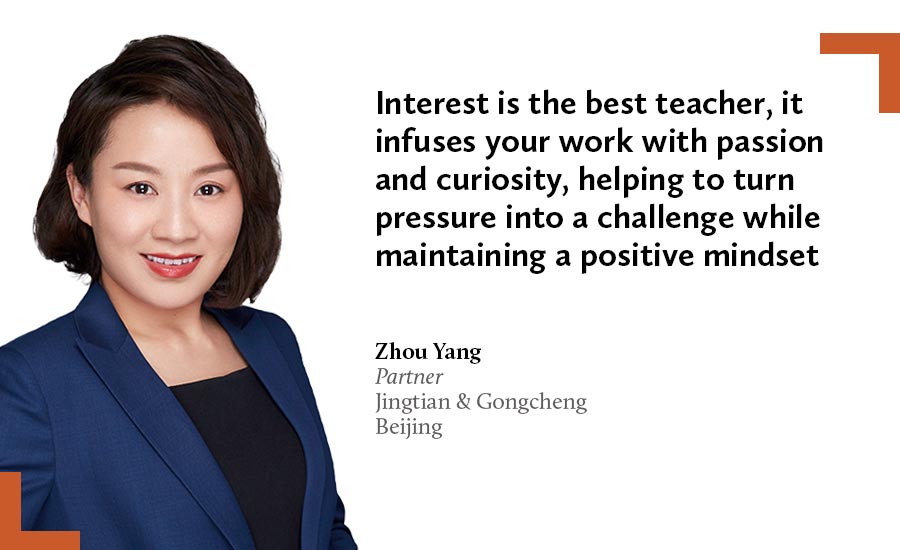
The strengths and passions of some of these young lawyers were not always immediately apparent. Qiu Pingping, a Wuhan-based partner at East & Concord Partners, says: “Before entering the legal profession, I systematically tried various careers, including civil service, state-owned enterprises and private sector jobs. I ultimately chose the legal industry, which I loved the most and was most suited for, and decided to commit to it for life.”
Choice of practice area
Selecting a legal practice area is crucial for a lawyer’s career. It determines where their time, energy and effort will be directed and can significantly influence their future legal success.
Some lawyers’ interests are clear from the outset and they dive deep into their chosen field early on. “Interest is the best teacher,” says Zhou Yang, a partner at Jingtian & Gongcheng in Beijing, “It infuses your work with passion and curiosity, helping to turn pressure into a challenge while maintaining a positive mindset.”
Likewise, Zhang Shiwen, a partner at Hui Ye Law Firm and based in Shanghai and Los Angeles, carved a path in entertainment law, including IP law, when she first joined the firm. She chose this path even though the field was still in its infancy in China, and its terminology was barely known in the legal market. “For almost a decade, my career was maturing and developing alongside China’s own entertainment law,” she says.
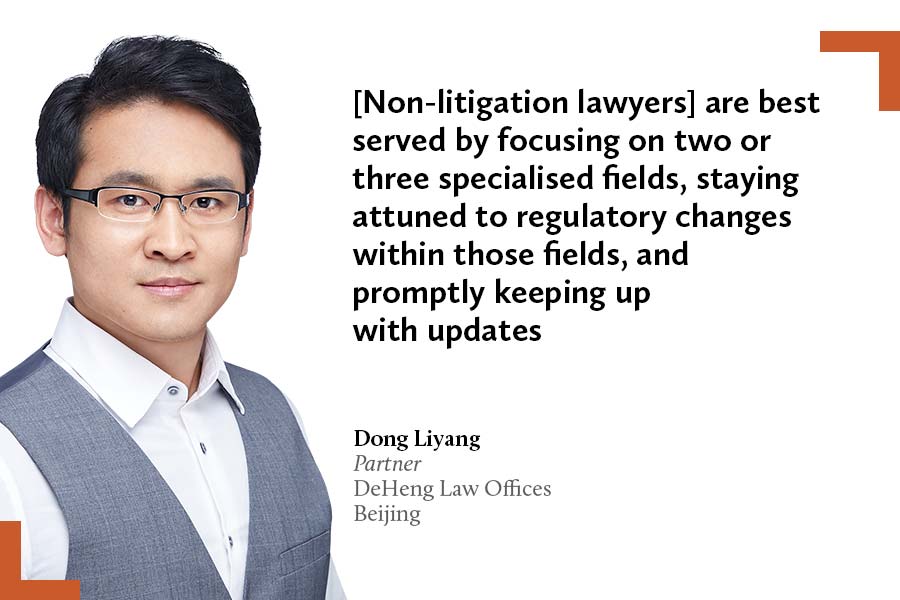
Dong Liyang, a Beijing-based partner at DeHeng Law Offices, offers a unique insight on choosing a practice area and industry. He says non-litigation lawyers “are best served by focusing on two or three specialised fields, staying attuned to regulatory changes within those fields, and promptly keeping up with updates”.
Dong believes it is best to avoid spreading oneself too thin, and choosing an industry that “has depth, a significant client base, is not in a regulatory grey area, and ideally has substantial growth potential”.
Jane Zhang, a Beijing-based partner at Jingtian & Gongcheng, says: “Choosing a direction should be based on a combination of one’s expertise, personal preferences and societal needs of the time”.
Calibrating the course
Determining the broad direction in practice area is just the first step, and it may be necessary to continually adjust the course in response to real-world situations, practical experience and individual circumstances.
During her internship at Joint-Win Partners in Shanghai, Chen Chang, now a partner at the firm, solidified her commitment to becoming a litigation lawyer by participating in both litigation and non-litigation projects. She actively engaged in various corporate disputes, gradually gaining insights into corporate management and crisis resolution.
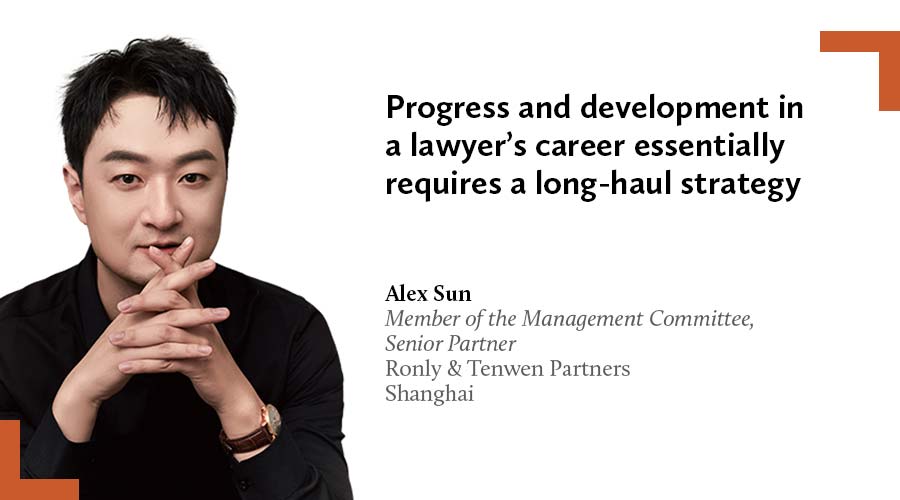
However, after five busy years as a litigation lawyer, she realised a pressing need for specialisation in her practice area. This led her to reconsider her career direction, setting her primary goal as “clarifying her client type and business focus within the next three to four years to become a specialist in that field”.
David Li, founding partner at Landing Law Offices in Shanghai, aspired to be an outstanding international commercial lawyer in his second year of practice. As he continually progressed toward this goal, he kept seeking a more suitable platform for his development, moving from a 30-person local law firm to one of the world’s largest outfits, and eventually founding Landing.
Taking strategic steps
Many lawyers set phased goals as a practical approach to methodically advance their careers. This not only allows them to concentrate their energy and resources over a specific period, but also breaks down larger objectives into manageable milestones. By doing so, they increase the likelihood of achievement which, in turn, fosters a sense of accomplishment, confidence and the motivation to persevere.

Liu Shanli, a partner at Jian Da Law Firm in Fuzhou, views a lawyer’s practice and growth as a process of gradual accumulation. He structured his career around five-year plans, progressing from building a solid foundation of legal expertise and service quality to becoming a team leader.
Ultimately, he aspires to establish a strong foothold in Fujian and expand his practice nationwide. “In over a decade of practice, the achievements I’ve attained today are the result of long-term learning and sensible planning,” he says.
Alex Sun, a member of the management committee and senior partner at Ronly & Tenwen Partners, and a strong advocate for methodical career planning, says: “Progress and development in a lawyer’s career essentially requires a long-haul strategy.”
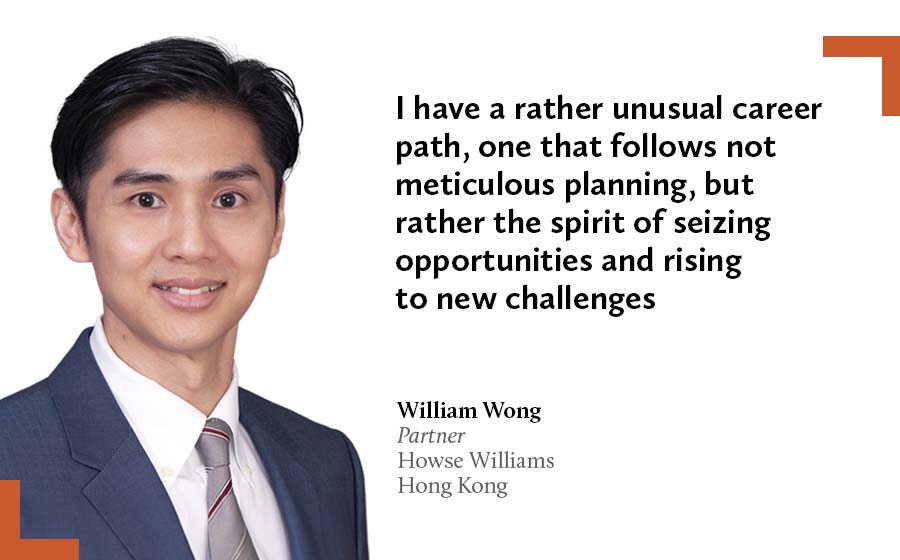
Emphasising the necessity of systematically advancing one’s professional journey, Sun sets phase-appropriate goals tailored to his career growth, steering towards both better leadership and firm development.
Pressing on
Setting goals helps lawyers establish the rhythm of their careers. But regardless of the pace, what counts is to keep moving forward.
Travis Wu, the director at Ellalan (Guangdong) Law Office in Guangzhou, lives by the motto “stay hungry, stay foolish”. His career path, transitioning from a salaried lawyer to an independent practitioner, then a partner and, ultimately, a founding partner, has been marked by constant self-challenges.
Wu says he achieved nearly all his phased goals ahead of schedule, and when the opportunity to establish his own law firm unexpectedly arrived a decade earlier than planned he decisively seized the chance, despite feeling under immense pressure at the time.
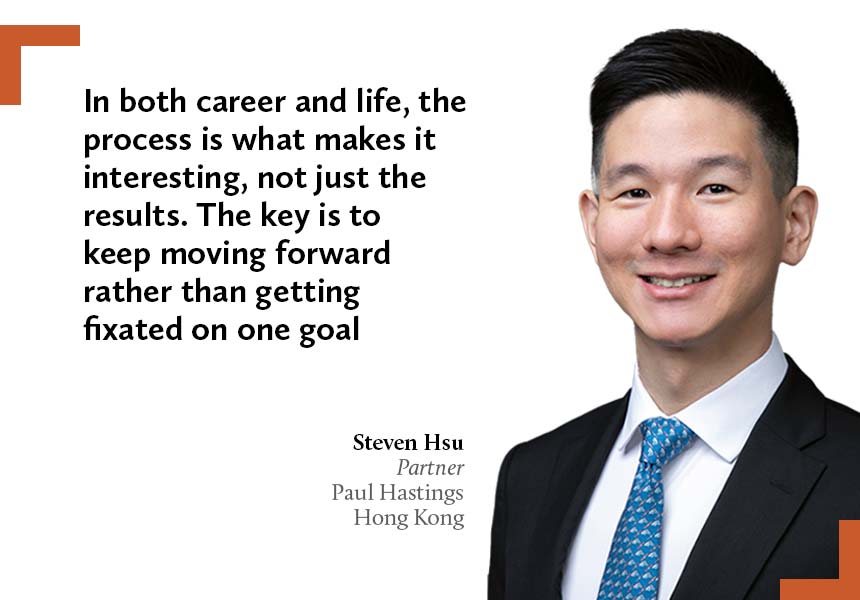
“This is quite a test for me,” he says. “On one hand, as the director, I need to co-ordinate the work of everyone in the law firm and, on the other hand, I need to constantly remind myself to handle each case at hand well.”
Rather than adhering to preconceived plans, many lawyers lean towards an open-minded approach, embracing changes and welcoming new opportunities and challenges as they arise.
Steven Hsu, a Hong Kong-based partner at Paul Hastings, says: “Set goals, but don’t fixate on them.” Hsu never envisioned moving to Hong Kong or working in the capital markets field before graduating from a US law school, but that is what happened and he had to adapt to these unforeseen developments.
“In both career and life, the process is what makes it interesting, not just the results”, he says. “I set long-term goals and then work backwards to deduce the mid-term and short-term actions to achieve them. This approach motivates me to press on. The key is to keep moving forward rather than getting fixated on one goal.”

William Wong, a Hong Kong-based partner at Howse Williams, possesses a strong background as a trilingual financial services regulatory lawyer with experience in both in-house and private practice.
His career began with a secondment to an investment bank as a litigator, before transitioning to an in-house litigation lawyer. Later, he served as a compliance manager after the bank’s internal restructuring, and subsequently took on the position of legal counsel with another bank, before eventually returning to private practice.
“I have a rather unusual career path, one that follows not meticulous planning, but rather the spirit of seizing opportunities and rising to new challenges,” he says.
In an ever-changing era, Mu Fei, a senior partner at Hylands Law Firm’s Beijing office, says: “Embracing change, going with the flow, and at times making the most of it can actually open new doors amid the shifts.”
Strategic elements
Due to the diversity and fluidity of lawyers’ career paths, there is no one-size-fits-all blueprint to follow. However, the rising stars share crucial qualities and strategies behind the speedy advancement of their careers.
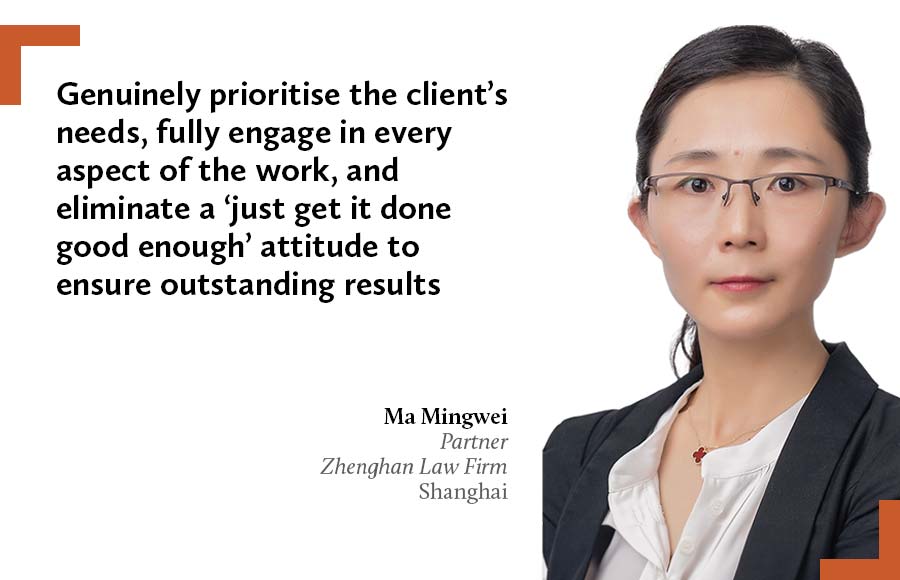
“Learning knows no bounds, only through unwavering persistence can we uncover true wisdom,” goes a saying from ancient Chinese statesman Zeng Guofan. This resonates with lawyers as a fundamental truth of the legal profession, with continual learning regarded as an essential quality.
Limy Lin, a senior partner at Hiways Law Firm’s Shanghai office with 11 years of experience in trade remedies, says a lawyer should “always be in learning mode, and each new case provides us with fresh insights and expands our knowledge base”.
Taking anti-dumping cases as an example, Lin says their complexity requires a deep understanding of anti-dumping investigation laws and mechanisms in various jurisdictions, as well as in political and cultural contexts. The cases also involve critical aspects such as sales data and cost data calculations, requiring her to seek relevant financial accounting knowledge to better handle them.
Career ethics and character frequently emerge as indispensable safeguards for successful career development, as highlighted in the lawyers’ responses.
Zhang Yaxing, a partner at Han Kun Law Offices in Beijing, says: “Although I didn’t specifically plan my career, I have always believed that, as long as I adhere to my professional ethics and character, and continuously improve my professional competence and competitiveness, I can meet the requirements of the mainstream market.”
Regarding client relationships, Huang Jianxin, a partner at SD & Partners in Shenzhen, says priority should be given to serving others before oneself. “We don’t simply see clients as clients but, within our capacities, we take on our work with a sense of ownership and aim for excellence,” he says.
Ma Mingwei, a partner at the Shanghai head office of Zhenghan Law Firm, echoes this perspective. “Genuinely prioritise the client’s needs, fully engage in every aspect of the work, and eliminate a ‘just get it done good enough’ attitude to ensure outstanding results,” she advises.
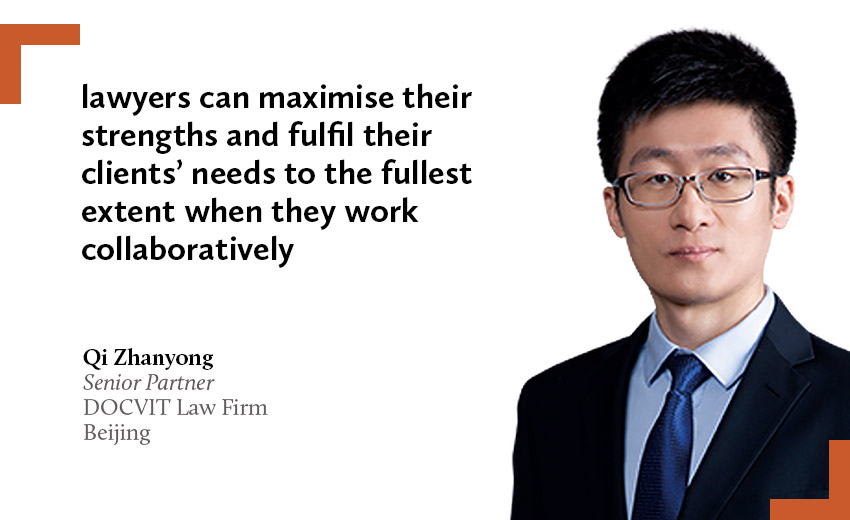
In a fiercely competitive market, wielding a specialised skillset can be crucial for lawyers to gain clients’ favour.
Ma says a lawyer’s most potent weapon is his or her expertise. Specialisation is a must. “I refer to specialisation in a comprehensive sense, encompassing not just legal and technological expertise, but also demanding well-rounded skills in business acumen and even psychology,” she says. “Hence, the key to genuine professional growth lies in the continual enhancement of one’s overall abilities, mindset and perspective.”
Qi Zhanyong, a senior partner at DOCVIT Law Firm’s Beijing office, says lawyers should align their career paths based on their individual situations and environmental factors while pursuing specialisation. He shares a practical rule: “Preserve your existing strengths and create the prospects you desire.”
The competitive edge of modern lawyers arises not only from their personal skills but also from the collaborative strength of their teams. The importance of teamwork was highlighted by many lawyers in their responses.
When it comes to teamwork, says Qi, lawyers “can maximise their strengths and fulfil their clients’ needs to the fullest extent when they work collaboratively”. This viewpoint is widely acknowledged by others.
Long Jintao, a partner at Yingke Law Firm’s Guangzhou office, has been assembling a team since the inception of his independent practice. Over the years, the team has grown from three members to more than a dozen, resulting in enhanced economic benefits.
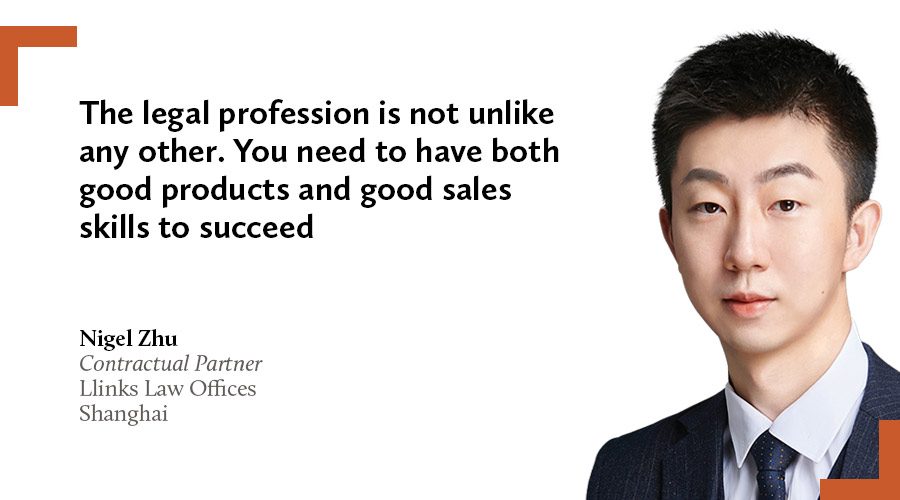
“An individual’s time, energy and vision are limited, while a group can achieve so much more,” says Long. “Filling a vacancy and empathy are vital to a team, and unity of strength leads to greater profitability and greater possibilities.”
Maintaining sensitivity to changes in emerging industries and capital markets is one of the key strategies for Ren Hua, a partner at Jingtian & Gongcheng’s Beijing office. As a non-litigation lawyer specialising in capital markets, he says maintaining this sensitivity helps him anticipate opportunities and crises resulting from industry and market changes, allowing for early preparation and poised responses.
Many lawyers have also incorporated active participation in industry events into their career strategies. One of them is Long, who believes gaining wide recognition within the industry allows him to “realise professional labelling, but also raises the awareness of my peers about my team’s professionalism, and facilitates inter-professional and inter-regional co-operation in the field”.
Nigel Zhu, a contractual partner at Llinks Law Offices in Shanghai, places particular focus on enhancing the quality of legal services and honing marketing skills in the current phase of his career. “The legal profession is not unlike any other. You need to have both good products and good sales skills to succeed,” he says.
The profession demands enduring years of high-intensity work, presenting substantial challenges to a lawyer’s energy and stamina. According to Grace Li, a Shanghai-based partner at Baker McKenzie FenXun, it is crucial for lawyers to “maintain a healthy lifestyle while consistently working hard”.
Whether running a marathon or managing a career path, maintaining rhythm is vital for the long distance towards the goal. As these successful lawyers have indicated, find focus, strive for balance, continually learn and, above all, keep moving.


 Post a comment
Post a comment Print article
Print article

